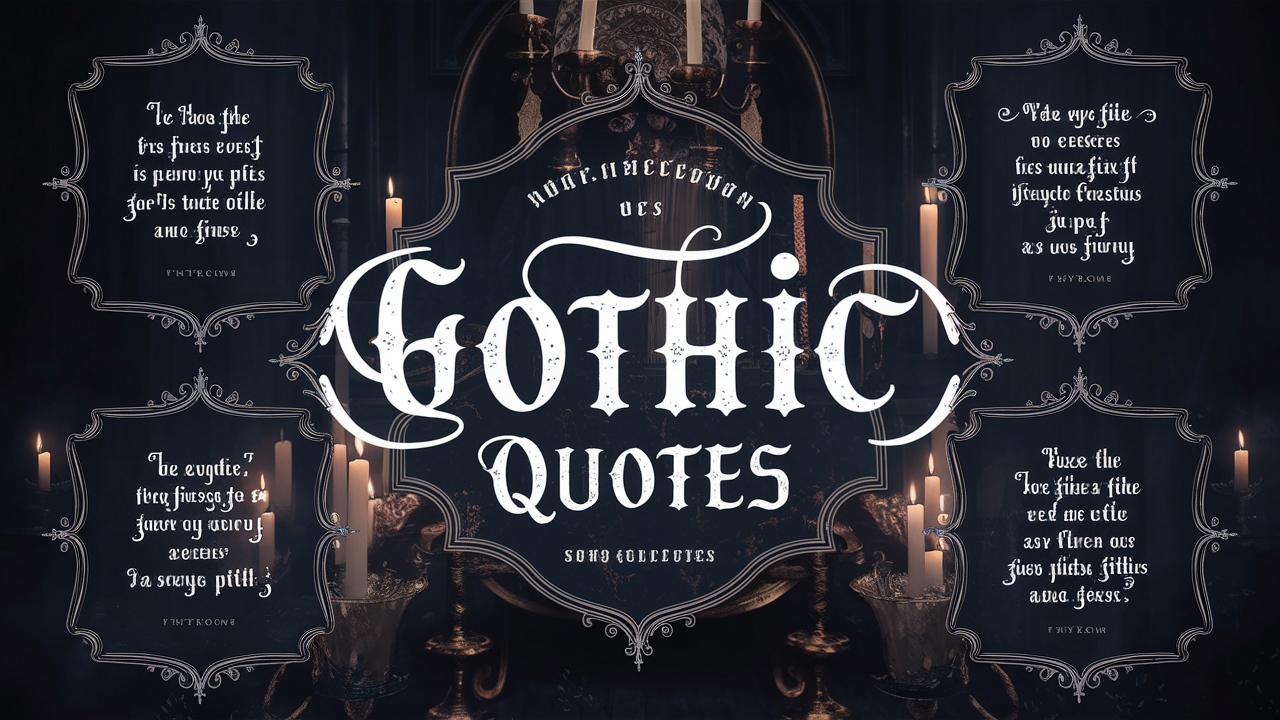In this collection of 101 Gothic Quotes, we explore quotes that embody the essence of Gothic literature—enigmatic, eerie, and thought-provoking. Each quote is accompanied by a brief description to help unravel its darker, more enigmatic meanings.
Gothic literature, with its hauntingly atmospheric settings and deep psychological insights, has captivated readers with its exploration of the macabre and the mysterious. It delves into themes of horror, darkness, and the supernatural, often reflecting the complexities of human nature and the shadows of the mind.
Darkness
“The dark is always just a little more beautiful than the light.”
Author: Edgar Allan Poe
Description:
Poe reflects on the allure and depth that darkness can bring, suggesting that it has an inherent beauty and complexity that light lacks.
“The night is more alive and more richly colored than the day.”
Author: Vincent Van Gogh
Description:
Van Gogh portrays the night as a vibrant, dynamic time, full of deeper hues and more vivid experiences compared to daylight.
“The darkness is always more familiar than the light.”
Author: H.P. Lovecraft
Description:
Lovecraft suggests that darkness, with its mysterious and unknown elements, feels more inherent to the human psyche than the clarity of light.
“It is in the darkest hours that the light shines the brightest.”
Author: Mary Shelley
Description:
Shelley highlights the paradox that even in the bleakest times, there is a glimmer of hope or truth that emerges.
“In the dark, we find the deepest truths.”
Author: Bram Stoker
Description:
Stoker implies that darkness can reveal profound and often unsettling realities that are hidden in the light.
“The shadows are my refuge; they tell the truth that the light conceals.”
Author: Charles Dickens
Description:
Dickens conveys that shadows and darkness expose truths that are otherwise obscured by daylight.
“Within the darkness, we confront our deepest fears.”
Author: Shirley Jackson
Description:
Jackson explores the idea that darkness forces us to face our most profound anxieties and vulnerabilities.
“Darkness is the canvas upon which the human soul is painted.”
Author: Ann Radcliffe
Description:
Radcliffe suggests that the dark, with its mystery and depth, reveals the true nature of the human soul.
“Only in darkness can we truly see the light.”
Author: Edgar Allan Poe
Description:
Poe emphasizes that it is through experiencing darkness that we come to appreciate and understand the nature of light.
“The night is alive with whispers and secrets.”
Author: Emily Brontë
Description:
Brontë captures the idea that the night holds an array of hidden and mystical revelations.
Horror
“Horror is the imagination that becomes reality.”
Author: Stephen King
Description:
King reflects on how horror originates from the mind and can manifest into frightening realities.
“The true horror is not the monster but the fear it inspires.”
Author: H.P. Lovecraft
Description:
Lovecraft suggests that the essence of horror lies not in the creature itself, but in the terror it invokes.
“Monsters are real, and ghosts are real too. They live inside us, and sometimes, they win.”
Author: Stephen King
Description:
King delves into the internal nature of horror, asserting that our inner demons can have a profound impact on us.
“The things that go bump in the night are merely reflections of our darkest fears.”
Author: Shirley Jackson
Description:
Jackson indicates that the eerie noises and shadows are manifestations of our deepest anxieties.
“Horror is not just about what is seen, but what is felt.”
Author: Clive Barker
Description:
Barker emphasizes that the true essence of horror lies in the emotional and psychological responses it elicits.
“The most terrifying monsters are those that hide within us.”
Author: Edgar Allan Poe
Description:
Poe suggests that the greatest horrors are the ones that come from within, rather than external sources.
“Fear is the most potent form of horror, for it reveals the unknown.”
Author: Anne Rice
Description:
Rice explores how fear exposes the mysterious and often unsettling aspects of existence.
“In the darkest corners of the mind, true horror takes shape.”
Author: Stephen King
Description:
King points out that the most profound horror is born in the recesses of the human psyche.
“Horror dwells in the spaces between reality and imagination.”
Author: H.P. Lovecraft
Description:
Lovecraft suggests that horror is found in the blurred lines between what is real and what is imagined.
“The fear of the unknown is the root of all horror.”
Author: Edgar Allan Poe
Description:
Poe highlights that the essence of horror is rooted in the fear of things that are not understood or explained.
Mystery
“The greatest mysteries are those that remain unsolved.”
Author: Agatha Christie
Description:
Christie suggests that the allure of mystery lies in its unresolved nature, leaving much to the imagination.
“Mystery is the veil that hides the truth from our eyes.”
Author: Arthur Conan Doyle
Description:
Doyle explores how mystery acts as a barrier, obscuring the underlying truth and keeping it concealed.
“Behind every shadow lies a secret waiting to be uncovered.”
Author: Edgar Allan Poe
Description:
Poe implies that shadows often conceal hidden truths or secrets that are yet to be revealed.
“The heart of mystery is the unknown, the unpredictable.”
Author: Charles Dickens
Description:
Dickens conveys that the essence of mystery lies in the unpredictability and the unknown elements that challenge understanding.
“Mystery is the art of leaving the audience in suspense.”
Author: Daphne du Maurier
Description:
Du Maurier highlights that mystery involves creating suspense and keeping people guessing.
“Secrets are the currency of mystery.”
Author: Agatha Christie
Description:
Christie suggests that secrets are central to the fabric of mystery, driving intrigue and suspense.
“The allure of mystery lies in its ability to evoke curiosity.”
Author: H.P. Lovecraft
Description:
Lovecraft points out that mystery captivates us by sparking curiosity and the desire to discover hidden truths.
“Mystery is the shadow of truth, lurking just beyond reach.”
Author: Ann Radcliffe
Description:
Radcliffe explores how mystery often represents a truth that remains elusive and just out of grasp.
“To solve a mystery is to unlock a piece of the unknown.”
Author: Edgar Allan Poe
Description:
Poe suggests that solving a mystery involves revealing and understanding parts of the unknown.
“Mystery is the dance between what is known and what is hidden.”
Author: Shirley Jackson
Description:
Jackson portrays mystery as the interplay between known facts and hidden elements, creating intrigue.
Death
“Death is nature’s way of telling us to slow down.”
Author: Dick Francis
Description:
Francis reflects on death as a reminder to appreciate life and take a moment to pause.
“The boundary between life and death is but a thin veil.”
Author: Edgar Allan Poe
Description:
Poe suggests that the separation between life and death is delicate and insubstantial.
“In the end, we all become shadows.”
Author: William Shakespeare
Description:
Shakespeare conveys the idea that in death, we all merge into the same intangible and ephemeral state.
“Death is not the end but a transition to the unknown.”
Author: Emily Dickinson
Description:
Dickinson presents death as a passage to a new, unexplored realm rather than a final conclusion.
“The dead leave behind whispers that haunt the living.”
Author: Charles Dickens
Description:
Dickens implies that the presence of the deceased lingers through memories and echoes that affect the living.
“Death is the ultimate mystery that lies beyond the veil of life.”
Author: H.P. Lovecraft
Description:
Lovecraft explores death as a profound and unknown enigma that exists beyond our current existence.
“Every shadow is a reminder of what once was.”
Author: Bram Stoker
Description:
Stoker suggests that shadows serve as reminders of the past and the lives that have come before.
“Death is the silent thief that takes away all we hold dear.”
Author: Edgar Allan Poe
Description:
Poe portrays death as an inevitable force that removes everything precious from our lives.
“The dead speak to us through the silence they leave behind.”
Author: Shirley Jackson
Description:
Jackson conveys that the absence left by the dead communicates volumes in its silence.
“Death is a journey into the eternal night.”
Author: H.P. Lovecraft
Description:
Lovecraft describes death as an entrance into an endless and mysterious darkness.
Madness
“Madness is a place where reason dares not tread.”
Author: Edgar Allan Poe
Description:
Poe explores madness as a realm beyond the bounds of rationality, where logic does not apply.
“In the madness of the mind, reality becomes a twisted illusion.”
Author: H.P. Lovecraft
Description:
Lovecraft suggests that madness warps our perception of reality, turning it into something distorted.
“Madness is the dark side of genius.”
Author: Edgar Allan Poe
Description:
Poe implies that madness and brilliance are intertwined, with one often accompanying the other.
“The line between sanity and madness is a fragile thread.”
Author: Charles Dickens
Description:
Dickens highlights how thin and delicate the boundary between sanity and madness can be.
“Madness is a mirror reflecting our deepest fears and desires.”
Author: Shirley Jackson
Description:
Jackson conveys that madness reveals our inner most anxieties and longings.
“In the throes of madness, we see the world as it truly is.”
Author: H.P. Lovecraft
Description:
Lovecraft suggests that madness can offer a raw and unfiltered view of reality, beyond conventional perceptions.
“Madness is a storm that ravages the mind.”
Author: Stephen King
Description:
King describes madness as a tumultuous force that disrupts and overwhelms mental clarity.
“To be mad is to live in a world of shadows and echoes.”
Author: Edgar Allan Poe
Description:
Poe portrays madness as an existence in a realm of illusions and fragmented perceptions.
“Madness is the ultimate rebellion against the constraints of reason.”
Author: Charles Dickens
Description:
Dickens explores madness as a defiance of rationality and societal norms.
“In madness, we find the truth of our deepest selves.”
Author: Shirley Jackson
Description:
Jackson indicates that madness can uncover profound truths about our true nature.
Obscurity
“Obscurity is the cloak that hides the essence of reality.”
Author: Edgar Allan Poe
Description:
Poe suggests that obscurity masks the true nature of things, keeping them hidden from clear understanding.
“In obscurity, we find the beauty of the unknown.”
Author: H.P. Lovecraft
Description:
Lovecraft explores how obscurity creates a sense of allure and intrigue through its unknown aspects.
“Obscurity is the artist’s friend, allowing the imagination to flourish.”
Author: Charles Dickens
Description:
Dickens conveys that obscurity provides a fertile ground for creativity and imaginative exploration.
“The obscure is where mysteries are born and secrets lie.”
Author: Shirley Jackson
Description:
Jackson highlights how obscurity is the breeding ground for enigmatic mysteries and concealed truths.
“To live in obscurity is to dwell in the shadows of existence.”
Author: Edgar Allan Poe
Description:
Poe describes living in obscurity as existing in the hidden and lesser-known aspects of life.
“Obscurity veils the truth, creating an aura of mystery.”
Author: H.P. Lovecraft
Description:
Lovecraft suggests that obscurity shrouds the truth in mystery, making it more intriguing.
“In the depths of obscurity, we discover our true selves.”
Author: Ann Radcliffe
Description:
Radcliffe implies that obscurity allows for self-discovery and reflection away from the public eye.
“Obscurity is the darkness in which secrets are kept safe.”
Author: Shirley Jackson
Description:
Jackson indicates that obscurity protects secrets by keeping them out of clear view.
“The obscure path leads to the most profound revelations.”
Author: Edgar Allan Poe
Description:
Poe conveys that obscurity often leads to significant and deep insights that are not immediately apparent.
“Obscurity hides the truth, but it also fuels our curiosity.”
Author: H.P. Lovecraft
Description:
Lovecraft points out that while obscurity conceals the truth, it also stimulates our desire to uncover it.
Supernatural
“The supernatural is the bridge between reality and imagination.”
Author: Stephen King
Description:
King explores how the supernatural connects our world with the realm of imagination and fantasy.
“Supernatural forces often reveal the hidden truths of existence.”
Author: Edgar Allan Poe
Description:
Poe suggests that supernatural elements can uncover deeper truths about our world and ourselves.
“The supernatural is the echo of ancient fears and desires.”
Author: H.P. Lovecraft
Description:
Lovecraft implies that supernatural phenomena reflect our most primal fears and longings.
“To encounter the supernatural is to glimpse the other side of reality.”
Author: Shirley Jackson
Description:
Jackson describes encountering the supernatural as seeing beyond the ordinary aspects of reality.
“The supernatural is the realm where reality and myth intertwine.”
Author: Charles Dickens
Description:
Dickens conveys that the supernatural exists where the real and mythical worlds merge.
“Supernatural occurrences challenge our understanding of reality.”
Author: Bram Stoker
Description:
Stoker highlights how supernatural events disrupt and question our grasp of what is real.
“The supernatural embodies the mysteries that elude our understanding.”
Author: H.P. Lovecraft
Description:
Lovecraft suggests that the supernatural represents the enigmatic aspects of existence that we cannot fully grasp.
“Supernatural forces are the shadows that dance at the edge of our reality.”
Author: Stephen King
Description:
King depicts supernatural forces as the elusive and haunting elements that linger on the periphery of reality.
“In the supernatural, we confront the unknown and the unimaginable.”
Author: Shirley Jackson
Description:
Jackson explores how the supernatural forces us to face things beyond the limits of human imagination.
“The supernatural is the canvas upon which our darkest dreams are painted.”
Author: Edgar Allan Poe
Description:
Poe suggests that the supernatural realm is where our deepest fears and dreams come to life.
Isolation
“Isolation is the silence that speaks the loudest.”
Author: Edgar Allan Poe
Description:
Poe portrays isolation as a profound silence that reveals inner thoughts and emotions.
“In isolation, we confront the shadows of our own mind.”
Author: H.P. Lovecraft
Description:
Lovecraft explores how being alone brings us face-to-face with our own internal struggles and fears.
“Isolation is the breeding ground for self-discovery and introspection.”
Author: Charles Dickens
Description:
Dickens highlights that isolation allows for deep personal reflection and understanding.
“The lonely soul finds solace in the echoes of their own thoughts.”
Author: Shirley Jackson
Description:
Jackson suggests that solitude leads one to find comfort in their own contemplations.
“Isolation reveals the true nature of one’s fears and desires.”
Author: Edgar Allan Poe
Description:
Poe indicates that being isolated exposes the raw and unfiltered aspects of our psyche.
“In isolation, the mind becomes a labyrinth of shadows and echoes.”
Author: Stephen King
Description:
King describes isolation as a state where the mind becomes filled with haunting and complex thoughts.
“Isolation is the dark room where our fears are magnified.”
Author: H.P. Lovecraft
Description:
Lovecraft conveys that isolation intensifies our fears and anxieties.
“The solitary life is a canvas upon which the mind projects its darkest images.”
Author: Ann Radcliffe
Description:
Radcliffe suggests that solitude allows the mind to create and focus on its most unsettling thoughts.
“Isolation is the echo chamber of the soul’s deepest sorrows.”
Author: Edgar Allan Poe
Description:
Poe depicts isolation as a space where one’s deepest griefs and struggles are amplified.
“In solitude, we are left alone with our own darkest thoughts.”
Author: Shirley Jackson
Description:
Jackson explores how solitude forces us to confront our most troubling and private thoughts.
Shadows
“Shadows are the whispers of the unseen world.”
Author: Edgar Allan Poe
Description:
Poe suggests that shadows hint at the presence of things that are not immediately visible.
“In the shadow’s embrace, we find the secrets of the unknown.”
Author: H.P. Lovecraft
Description:
Lovecraft conveys that shadows often conceal hidden truths and mysteries.
“Shadows are the canvas upon which our fears are painted.”
Author: Stephen King
Description:
King portrays shadows as the backdrop for our most profound anxieties and fears.
“The shadow is the dark reflection of our own hidden selves.”
Author: Carl Jung
Description:
Jung explores how shadows represent the parts of ourselves that we do not fully acknowledge.
“In the depths of shadows, we discover the mysteries of existence.”
Author: Edgar Allan Poe
Description:
Poe implies that shadows hold the enigmatic aspects of life that we are yet to understand.
“Shadows are the echoes of our fears and desires.”
Author: H.P. Lovecraft
Description:
Lovecraft suggests that shadows reflect our inner fears and longings.
“The shadows of the mind are darker than the shadows of the night.”
Author: Shirley Jackson
Description:
Jackson highlights that mental and emotional shadows are often more profound and complex than physical darkness.
“Shadows dance in the spaces between reality and imagination.”
Author: Charles Dickens
Description:
Dickens conveys that shadows exist in the liminal space between what is real and what is imagined.
“The shadow reveals what the light conceals.”
Author: Edgar Allan Poe
Description:
Poe suggests that shadows often expose aspects of reality that are hidden in the light.
“In the play of shadows, we glimpse the nature of the unseen.”
Author: H.P. Lovecraft
Description:
Lovecraft portrays shadows as a way to perceive the hidden aspects of existence.
Despair
“Despair is the darkness that consumes the soul.”
Author: Edgar Allan Poe
Description:
Poe depicts despair as a powerful force that overwhelms and engulfs the inner self.
“In the grip of despair, hope becomes a distant memory.”
Author: H.P. Lovecraft
Description:
Lovecraft explores how despair can make hope seem far off and unreachable.
“Despair is the silence that follows the collapse of dreams.”
Author: Stephen King
Description:
King conveys that despair emerges when one’s aspirations and hopes have been shattered.
“Despair is the shadow that follows the loss of purpose.”
Author: Charles Dickens
Description:
Dickens describes despair as a consequence of losing one’s sense of direction and meaning in life.
“In the depths of despair, we find the cold truth of our own fragility.”
Author: Edgar Allan Poe
Description:
Poe suggests that despair reveals the harsh reality of human vulnerability.
“Despair is the eternal night that extinguishes all light.”
Author: H.P. Lovecraft
Description:
Lovecraft portrays despair as a profound darkness that extinguishes all sources of hope and comfort.
“In the heart of despair, we confront our deepest fears.”
Author: Stephen King
Description:
King explores how despair forces us to face our most profound and unsettling fears.
“Despair is the echo of dreams that have withered away.”
Author: Shirley Jackson
Description:
Jackson describes despair as a reflection of lost hopes and failed ambitions.
“Despair is the void that fills the space left by shattered dreams.”
Author: Edgar Allan Poe
Description:
Poe conveys that despair occupies the emptiness left by dreams that have been broken.
“In the darkness of despair, we search for the faintest glimmer of hope.”
Author: H.P. Lovecraft
Description:
Lovecraft highlights that even in the depths of despair, there remains a search for even the smallest sign of hope.










